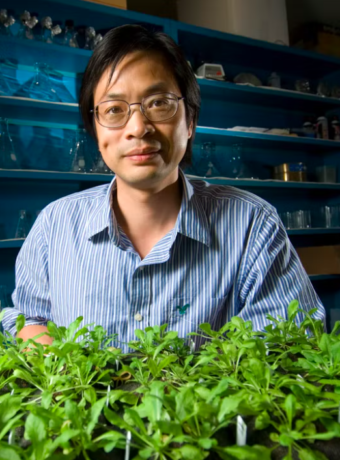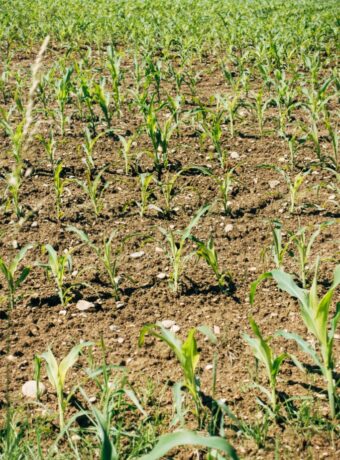This week’s ‘Global Food System Bite’ comes from an article titled Ultra-processed foods are trashing our health and the planet (Originally published on The Conversation).
The world population is forecast to reach 9.7 billion by 2050, up from 7.3 billion today. This increase in population, as well as the rise of the global middle class, presents a considerable challenge when it comes to food production. We need to produce more food than ever before, but we need to do so in a way that doesn’t destroy our planet in the process.
Though there are more than 7,000 edible plant species which could be consumed for food, today, a mere 15 crop species provide the majority of the world’s energy intake. This course of action is unsustainable for a number of reasons. First, it leads to feelings of monotony and blandness in diets across the globe. When the same crops are consumed day in and day out, not only do people get bored with their meals, but they also miss out on the essential nutrients that come from consuming a variety of foods. Additionally, this lack of diversity makes crops more vulnerable to disease. If one species becomes diseased, it can quickly decimate an entire crop, leading to widespread famine. Finally, this reliance on just a few crops creates an unstable market. When the price of one crop fluctuates, it can have a ripple effect on the entire global economy. In order to create a more sustainable and diverse world, we need to encourage people to consume a wider variety of plant-based foods.

What are ultra-processed foods?
Ultra-processed foods are a type of food that has been heavily processed and typically contains little to no whole foods. These foods often contain cosmetic additives and are designed for quick and easy consumption. Some examples of ultra-processed foods include confectionery, soft drinks, chips, pre-prepared meals, and restaurant fast-food products. These foods are often high in calories and low in nutrients, making them a potentially unhealthy choice for regular consumption. While they may be convenient, it is important to be aware of the potential health risks associated with consuming too many ultra-processed foods. When eaten in moderation, however, ultra-processed foods can be a part of a healthy diet.
These can be contrasted with this are “traditional” foods—such as fruits, vegetables, wholegrains, preserved legumes, dairy and meat products—which are minimally processed, or made using traditional processing methods. While traditional processing, methods such as fermentation, canning and bottling are key to ensuring food safety and global food security. Ultra-processed foods, however, are processed beyond what is necessary for food safety.

Australians have particularly high rates of ultra-processed food consumption. These foods account for 39% of total energy intake among Australian adults. This is more than Belgium, Brazil, Columbia, Indonesia, Italy, Malaysia, Mexico and Spain—but less than the United States, where they account for 57.9% of adults’ dietary energy. According to an analysis of the 2011–12 Australian Health Survey (the most recent national data available on this), the ultra-processed foods that contributed the most dietary energy for Australians aged two and above included ready-made meals, fast food, pastries, buns and cakes, breakfast cereals, fruit drinks, iced tea and confectionery.
Environmental Impacts
Agriculture is responsible for a range of environmental impacts, both bad and good. On the one hand, it is a significant source of greenhouse gas emissions, accounting for around one-third of all emissions. It is also responsible for 70% of freshwater use and 38% of global land use. On the other hand, agriculture can also help to sequester carbon in the soil and provide habitat for wildlife. In fact, it is estimated that around 80% of the world’s biodiversity is found on farmland.
The type of agriculture practiced plays a big role in its environmental impact. For example, livestock farming tends to have a larger impact than crop farming. This is due to a number of factors, including methane emissions from cows and the loss of carbon-absorbing vegetation. In addition, the way in which crops are grown can also impact the environment. For example, intensive agriculture using synthetic fertilizers and pesticides can cause soil and water pollution. Conversely, organic agriculture relies on natural processes and results in fewer emissions.
There are also environmental concerns linked to ultra-processed foods.
A new study has found that the production of ultra-processed foods is having a negative impact on the environment. The study, which was led by researchers in Brazil, looked at the effect of these foods on both human health and the environment. Ultra-processed foods are a dominant component of the food supply in many countries, and their sales are rapidly growing in others. The study found that these foods come at the expense of the cultivation, manufacture and consumption of “traditional” foods. Traditional foods are often more nutritionally dense than their processed counterparts, and they typically have a lower carbon footprint. The switch to ultra-processed foods has thus had a negative impact on both human health and the environment.

The over-reliance on a small number of crop species to produce ultra-processed foods places a huge burden on the environment. These crops are typically chosen by food manufacturers because they are cheap to produce and have high yields. However, this can lead to problems in the long run, as the soil becomes depleted of nutrients and the land is left exposed to erosion. In addition, these crops are often grown in monoculture systems, which means that they are not rotated and the same piece of land is used year after year. This can lead to a build-up of pests and diseases, which can further damage the environment. Animal-derived ingredients in ultra-processed foods also contribute to this problem, as the animals that provide these ingredients typically feed on the same crops as those used in human food production. As a result, the over-reliance on a small number of crop species to produce ultra-processed foods is damaging to both the environment and the food supply chain.
The rise in popularity of ultra-processed foods has had a significant impact on the quality of our diet and the diversity of our food supply. Ultra-processed foods are typically high in sugar, fat and salt, and low in essential nutrients like vitamins, minerals and fiber. They also tend to be highly addictive, making it difficult to eat them in moderation.
Most packaged foods and drinks in Australia contain ingredients that are linked to biodiversity loss, such as sugar, wheat flour, vegetable oil and milk. In addition, many of these ingredients are also associated with health problems like obesity, type 2 diabetes and heart disease. As a result, the rising consumption of ultra-processed foods is having a negative impact on both our health and the environment.
How do we fix this?
According to the researchers, “The environmental impact of ultra-processed foods is avoidable. Not only are these foods harmful, they are also unnecessary for human nutrition. Diets high in ultra-processed foods are linked with poor health outcomes, including heart disease, type-2 diabetes, irritable bowel syndrome, cancer and depression, among others.”
The over-reliance on a small number of crops as the basis of the world’s food supply leaves it vulnerable to shocks, such as disease, pests and extreme weather. This was dramatically demonstrated in the Irish potato famine of the 1840s, when a fungal disease wiped out the potato crop on which millions of people depended for their survival. To counter this, food production resources across the world could be re-routed into producing healthier, less processed foods. For example, globally, significant quantities of cereals such as wheat, maize and rice are milled into refined flours to produce refined breads, cakes, donuts and other bakery products. These could be rerouted into producing more nutritious foods such as wholemeal bread or pasta. This would contribute to improving global food security and also provide more buffer against natural disasters and conflicts in major breadbasket areas. However, this would require a significant shift in attitude and investment at both governmental and individual levels.

At an individual level, “reducing your consumption of ultra-processed foods is one way by which you can reduce your environmental footprint, while also improving your health.”
Consumers have the power to effect change through their purchasing decisions. By choosing to buy foods that are healthy and sustainable, consumers can send a message to the food industry that these are the types of products they want to see more of. For instance, the demand for palm oil has been on the rise in recent years due to its use in a variety of ultra-processed foods. However, palm oil is associated with deforestation in Southeast Asia, where much of it is produced. As a result, there is growing pressure on manufacturers to find alternatives to palm oil. If consumers shift their preferences towards healthier and more sustainable foods, it could have a significant impact on the food industry. In turn, this could lead to greater conservation of environmental resources.



